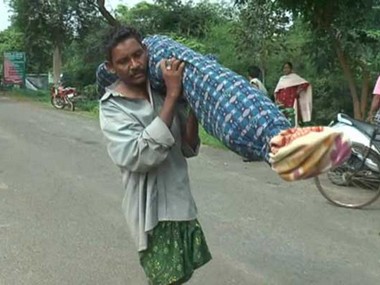“Death…”, said Jacob Needleman, a philosopher and author, “…is a great equaliser”. Those who have a lot of material wealth cannot take it with them in death, and those who don’t have anything, have nothing to take along anyway. But there is a difference between the deaths of the upper and lower classes. The better-off get decent funerals, but the poor sink further into the debt unless they get the pauper’s funeral with the help of local bodies. Or in
this case, face indignity even in death. The graphical description in this Saturday morning report is depicted in a way that a body, especially of the poor, deserves no respect. The ambulance service provider in this report cited “protocols” and “provisions” justifying why the crew denied to carry the 7-year-old’s body back to its residence when she died en route hospital and off-loaded the child’s parents. Unfortunately, rules prevail here. [caption id=“attachment_2989660” align=“alignleft” width=“380”] Dana Majhi carrying his wife on his shoulder. PTI[/caption] Of course, rules don’t always prevail. I have seen a body of an accident victim, which needed to be shifted to the AIIMS in Delhi for a post-mortem. But the family had to hire a private ambulance because a policeman told them that “our ambulance has broken down”. A private ambulance was suspiciously available, just 10 meters away. Rules don’t require the police ambulances to be well-maintained. The family could afford it, but that’s another matter. Recently, Odisha man Dana Majhi had to
carry his wife’s body on his shoulder for 10 km because the hospital refused to provide a transport. It can well be argued that hospitals have to treat, not help in the last-mile journey to the funeral. But when the victim or patient is poor, everything becomes unaffordable, like life itself. However, officials had said he did “not wait” and waiting in India is difficult to measure, especially for the poor. This news report
listed how Majhi, and the likes of him who are penniless have waited for succour under the Pradhan Mantri Awas Yojana, the employment guarantee scheme, the Forest Rights, Food Security Act, etc. all adding up to at least a dozen. But delivery, of course, is a problem. Delivery is where one should measure the quality of governance. It apparently is a long crawl from the Red Fort to a poor man’s door. Manjhi was entitled to the power supply of 80W per month for a bimonthly bill of Rs 160. What prevented from keeping the power running in his house? Majhi could not switch on the lights in his house for the past several months because a tree had fallen on the power lines and was not set right because “no one had complained”. Since when have we heard the poor complain? Helpless, they trade their vote for a promise or cash. When an 80-year-old Salamani Barak was run over by a train and had to be taken to a hospital in Odisha for post-mortem, the rigour mortis had set in. For want of an ambulance, the police tried to hire an autorickshaw but the driver demanded Rs 3,500. The hospital staff, reportedly at the behest of the police,
broke her body at her hip, bundled her in a cloth and carried her by slinging it on a bamboo pole in Balasore district. Now, Odisha Human Rights Commission has sought a report. To the dead, these things don’t matter, but to the kith and kin, even the ‘cheapest life’ – which poor are assumed to be living – has some value: at least in their death. What this denotes is: the poor can be preyed upon easily, and should be uncomplaining, like Ravindra Barik, her son. The Times of India
quoted him saying, “They could have been a little more human. I initially thought of filing a case against the policemen. But who would act on our complaint." That’s the nub of the matter, where announcements and schemes do not translate into action. Recall how a person in Tamil Nadu tried to shame an official for not delivering? The Hindu had this harrowing
narration about how, when the funeral expenses allowed under a government scheme, for a funeral did not reach a family, the deceased’s son and his friends “group of youngsters in Ulundurpet organised a novel protest of seeking alms to raise money to ‘bribe’ a revenue official to release Rs 12,500 sanctioned by way of funeral expenses to a bereaved family.” Probably there are more such stories which have gone unreported. On the other hand, in a city like Mumbai where hospitals are allotted lands under a condition that a certain number of beds be reserved for the poor and that they also be treated free or at concessional rates, instead about 11 leading private charitable hospitals in the city did not keep the commitment, states The Times of India report. They charged hefty deposits during the admission from the poor. Even though the Comptroller and Auditor General has sought its rectification but this is an age-old practice. Either the government is uncaring, or this is a modern version of Sisyphus’ punishment. The lives of the poor in India, as the above cases depict, are merely reduced to statistics.
Delivery is where one should measure the quality of governance. It apparently is a long crawl from the Red Fort to a poor man’s door. Odisha apathy cases, however, mirror how lives of India’s poor are now merely reduced to statistics
Advertisement
End of Article
Written by Mahesh Vijapurkar
Mahesh Vijapurkar likes to take a worm’s eye-view of issues – that is, from the common man’s perspective. He was a journalist with The Indian Express and then The Hindu and now potters around with human development and urban issues. see more


)

)
)
)
)
)
)
)
)



